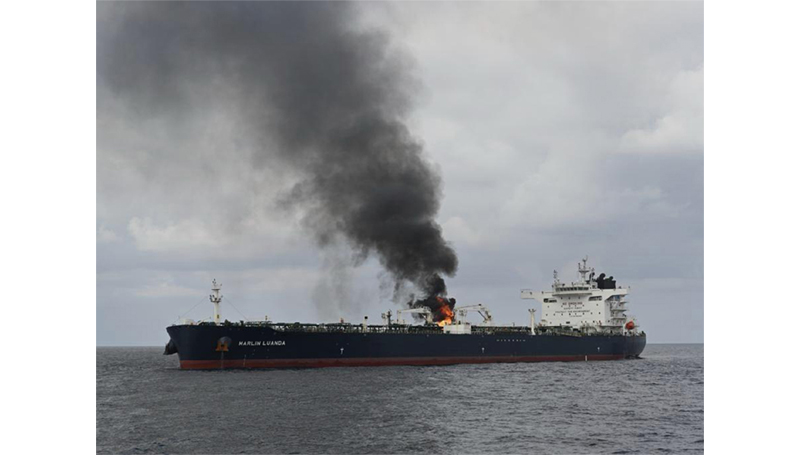In the early hours of Saturday morning, Yemen’s Houthi militants targeted an oil tanker in the Red Sea with a ballistic missile, causing damage to the Panama-flagged, Greek-owned vessel. U.S. Central Command reported that the attack, which occurred around 1 a.m., struck the oil tanker Wind, which had recently docked in Russia and was en route to China. Both China and Russia maintain ties with Iran, the Houthis’ primary benefactor, for military equipment and oil.

Although the Houthis did not immediately claim responsibility for the assault, it comes amidst a series of attacks launched by the group in response to the ongoing Israel-Hamas war in the Gaza Strip. The militants have claimed to have shot down another U.S. military MQ-9 Reaper drone over Yemen and have targeted shipping, disrupting trade on a vital maritime route leading to the Suez Canal and the Mediterranean Sea.
According to U.S. Central Command, the missile strike “caused flooding, which resulted in the loss of propulsion and steering.” However, the crew of the Wind was able to restore these functions, and no casualties were reported. The tanker resumed its course under its own power.
The attack was also acknowledged by the British military’s United Kingdom Maritime Trade Operations Center and the private security firm Ambrey, with the latter stating that the incident caused a fire aboard the Wind.

Since the outbreak of the Israel-Hamas war, the Houthis have attacked or threatened more than 100 commercial or military ships in the Red Sea or the Gulf of Aden. The group claims that their attacks are a protest against Israel’s war against Hamas and U.S. support for Israel. However, U.S. officials point out that many of the targeted ships have no connection to Israel.
In recent weeks, Houthi attacks have decreased as the rebels have been targeted by a U.S.-led airstrike campaign in Yemen. The U.S. and the United Kingdom, with support from other countries, have conducted four rounds of joint airstrikes to destroy Houthi capabilities in Yemen. Additionally, the U.S. military regularly conducts self-defense strikes against Houthi missiles and drones when it detects preparations for an attack.

Despite the decrease in attacks, shipping through the Red Sea and Gulf of Aden remains low due to the ongoing threat posed by the Houthis.
The Houthis also claimed that they shot down a U.S. Reaper drone on Thursday using a surface-to-air missile. They described the drone as “carrying out hostile actions” in Yemen’s Marib province, which remains under the control of allies of Yemen’s exiled, internationally recognized government.

Prior to Thursday’s incident, three Reaper drones have crashed since November in or near Yemen, with at least two of them confirmed to have been shot down by the Houthis. Reapers, which cost approximately $30 million each, are capable of flying at altitudes up to 50,000 feet and have an endurance of up to 24 hours before needing to land.
The recent attack on the Greek-owned oil tanker and the ongoing conflict between the Houthis and the U.S.-led coalition highlight the continued instability in the region and the threats posed to international shipping and trade.



